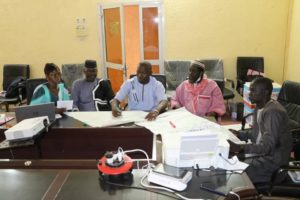Measuring trust to improve access to justice in central Mali

To ensure that the frustration from growing impunity does not lead to a cycle of violence, Interpeace has joined the Institut Malien de Recherche-Action pour la Paix (IMRAP) and several United Nations bodies to fight impunity and improve access to justice in central Mali.
A new project will identify the causes and perceptions of impunity in central Mali’s Mopti and Ségou regions, put in place a mechanism that responds to the need for social justice and ensure that the justice system is more efficient and enjoys the trust of the population to fight impunity. It will also facilitate access to justice for the population of central Mali and ensure protection of victims.
The project, known as “Integrated approach to fight against impunity and improve access to justice in central Mali”, is a 30-month initiative jointly implemented by IMRAP, Interpeace, the Office of the United Nations High Commissioner for Human Rights, the United Nations Entity for Gender Equality and Empowerment of Women (UN Women), and the United Nations Development Programme (UNDP) with the financial support of the UN Secretary-General’s Peacebuilding Fund (PBF).
A deteriorating violent conflict in the central regions of Mali – mainly between ethnic Dogon and Fulani armed groups – has made it difficult to build trust and cohesion between communities in central Mali. The inability of the justice system to hold perpetrators of violent behaviour accountable has made impunity one of the aggravating factors of the ongoing violence. Despite this reality, the way laws are framed and implemented in Mali has limited victims’ access to justice and nurtured distrust in the judicial system.
Through this project, a barometer for perception of impunity by the population across central Mali will measure the level of trust in the justice system by people in Ségou and Mopti where the project is being implemented.
“Basing interventions on solid data is paramount for key actors to properly understand and address main factors of conflict and social strife. The barometer ensures that the project and the sector at large can be informed by high quality data about how communities perceive their situation with regards to equal access to justice,” says Helene Bradburn, Interpeace Mali’s Monitoring, Learning and Evaluation Officer.
- Credits: Ibrahim Haidara, IMRAP
Interpeace and IMRAP are leading the process to collect and analyse data, using an inclusive and participatory approach that will witness the active participation of the local population, relevant authorities – especially those in the judicial system - and project partners.
“Communities are not only involved but are very much leading every step of the way in this methodology; from designing the survey questions, through which data is collected, to providing the data itself, and finally analysing the quantitative findings,” explains Ms Bradburn.
As the first research of its kind in Mali, the barometer will generate enough data to inform the support provided by the consortium’s partners and key actors of Mali’s formal justice system, as well as inform future dialogue initiatives.
“Thanks to this advanced tool, we can develop an unmatched understanding of the justice and impunity situation in central Mali. By providing this data to UN agencies and partners, we are ensuring that joint interventions really answer local needs and provide pertinent solutions,” Concludes Ms Bradburn.
The barometer will be used to understand how the people feel about the justice system and the results will be vital in influencing decision-makers in Mali.


